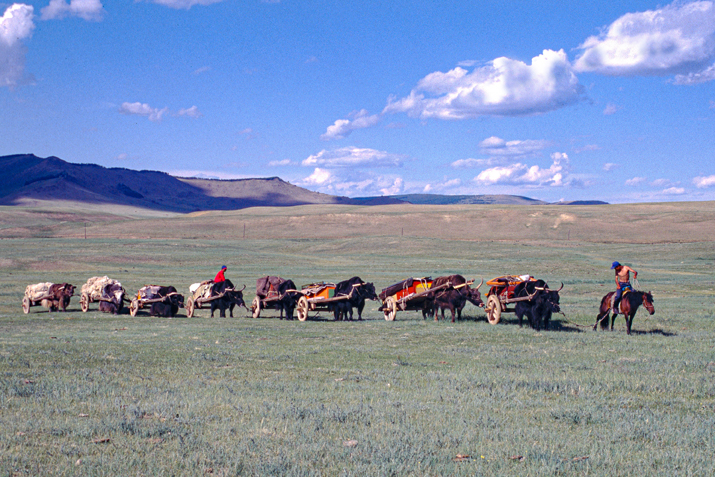
Bewitched by shamans
N 51°21'785'' E 099°21'046''
Day: 115-123
Sunrise:
08:40/08:53
Sunset:
17:33/17:24
Total kilometers:
1146
Soil condition:
Ice, snow
Temperature – Day (maximum):
minus 13°C
Temperature – day (minimum):
minus 18°C
Temperature – Night:
minus 30°C
Latitude:
51°21’785”
Longitude:
099°21’046”
Maximum height:
1475 m above sea level

Around midday we reach the stately one-storey Tsataan house in the village. A young, agile woman welcomes us and invites us into the large wooden house. “Please sit down,” she says, pointing to two stools. It only takes a few moments for us to feel sympathy on both sides. We tell Tsaya about our long-cherished wish to spend a winter with the reindeer nomads. Whereupon she tells us briefly about her life.
“After I came back from America, I got an offer to help set up the Tuwa visitor center here. It took two years and I really enjoyed it. But then the job came to an end. There was then another opportunity to live with a Tuwa family for a while. I gladly accepted and fell in love with one of them. Now I’ve been living with him in the taiga for four years and I’m the happiest person in the world. My family can’t understand me. No one can understand why I swapped luxury and city life for life in the taiga. There were even newspapers that wrote about me on the front page. “Young Mongolian woman bewitched by shamans”, they said. That is what many believe. But the fact that I am here of my own free will is incomprehensible to city dwellers,” she says. “Well, it’s hard for a city dweller to imagine living without luxury. Especially in the long term. Don’t you ever miss it? Even though I like to live the simple life, I do occasionally feel the urge to take a hot shower or eat my favorite food. After eight years in America, do you never crave it? I’m interested. “No. I’m happy in the taiga. I like hunting and enjoy the peace and quiet and the fantastic air. I wouldn’t want to live in a city like Ulan Bator. Far too much stress and terrible air. People get sick there,” she replies.
“We can understand you very well. We’ve been on the road since 1991. Only occasionally in Germany to organize another trip or expedition. That’s also the reason why we want to live with you now. Not as tourists, but we want to share life with you as much as possible. Do you think your clan would mind?” “I don’t think so. But it makes sense to pay us a visit first. Then you can introduce yourselves personally and tell us why you want to stay with us for so long,” she suggests. “It’s a good idea, but unfortunately your mayor is now causing us problems. We’re not allowed to set up a yurt at your place.” “What a load of garbage. We have nothing against you living in a yurt. She has no say in the matter,” we hear with relief. “The mayor warned us that you were asking for a lot of money. Is that true?” asks Tanja. “The mayor is a stupid cow and not popular. She’s also the one who’s after the money. The government sells tickets to tourists. The Tuwa don’t want that at all, because the money stays with the government or wherever. We don’t see a single Tugrik. Apart from that, we are not animals in a zoo for which you buy a ticket so that you can photograph them at will. The money from all the tourism companies that bring people to us passes us by completely. The Tuwa’s only income comes from the artwork we carve from reindeer antlers and sell to tourists. But they don’t have any money in their pockets or want everything for a dollar. There’s still a lot going wrong,” she explains.
“By the way, we are not Tsataan as the Mongols call us. This comes from the word tsaa which means reindeer. Tsataan means nothing other than reindeer herder. That sounds a bit derogatory to us. We own reindeer and are nomads, but our name is not Reindeer Herder. We don’t want that. We are from the Tuwa people. Tuva is a region in Russia where we originally come from. Our people are named after this region and that is why we are called Tuwa, Tsaya explains.
“When is a good time to visit you?” I ask. “It’s unfavorable at the moment. At the moment, only old women and a few men live in the camp. Most of them are out hunting. But the hunters will be back in ten days. Then it would be good,” she explains. “We’ve heard that many families live in the village with their children. Is that true?” I ask. “Yes, that’s right. They have to go to Tsagaan Nuur for the first few years because of school. When the children are older, however, many women return to their herds in the taiga. That’s where they feel most comfortable.
“Should we bring a few gifts for our guests?” asks Tanja. “That would be nice. We need ropes to tie up our reindeer, tea, tobacco and something to snack on. We would be very happy about that,” Tsaya replies with a laugh. “We are looking forward to visiting you. Now we just have to sort out the problem with the two mayors. I have no idea how we’re going to do that,” I say thoughtfully. “Let us worry about that,” Tsaya replies kindly. “By the way, we heard about you from Shagai weeks ago. He announced you as if the queen and king were giving us an audience. It’s nice to talk to normal people,” she says.
We look forward to your comments!

